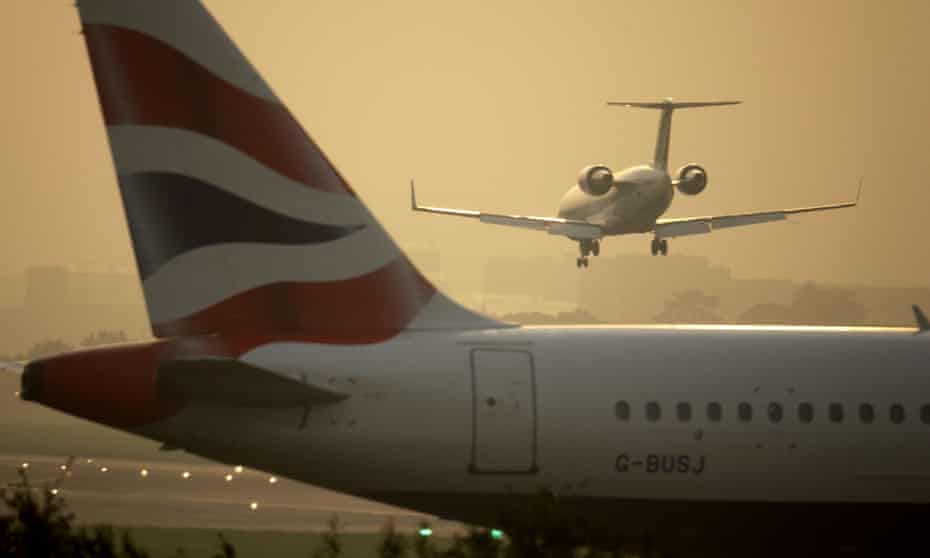‘Cop26 own goal’: despair over budget backing for flights and roads
Chancellor’s speech did not mention the climate crisis despite UK-hosted climate summit opening on Sunday

Rishi Sunak’s decision to make domestic flights cheaper, freeze fuel duty and spend GBP21bn on roads just before the Cop26 climate summit has prompted a furious reaction from green campaigners.
The chancellor’s budget speech did not mention the climate crisis despite the UK-hosted summit of 196 nations opening in Glasgow on Sunday. The UK’s cut in foreign aid funding has dented its climate credibility with developing nations but was in effect cut further by the inclusion of Covid vaccine donations.
“The chancellor declared the UK was entering an ‘age of optimism’ but instead he extended the age of fossil fuels,” said Luke Murphy, at the Institute for Public Policy Research. “Sunak talked for longer about beer duty than our duty to future generations to address the climate crises. This budget was an own goal for a government that should be leading the world into a new low-carbon age [at] Cop26.”
Katie White of WWF said: “The budget announcements take us headlong in the wrong direction. If the chancellor is serious about levelling up and improving life chances for future generations then he must invest now to deliver the net zero transition. Future generations won’t forgive or forget those who fail to act while there’s still time.”
Sunak halved the tax on domestic flights, which are already far cheaper and more polluting to take than trains. Air passenger duty was increased by GBP4 on “ultra-long” flights over 5,550 miles, from GBP87 to GBP91. But Sunak said: “Less than 5% of passengers will pay more.” Overall, the changes are a tax giveaway of GBP30m a year.
“Just five days before the start of Cop26, it was astonishing that the chancellor didn’t even mention the words ‘climate’ or ‘nature’,” said the Green party MP, Caroline Lucas. “This wasn’t just a failure to address the climate emergency, it actually took us backwards. It’s hard to think of a greater dereliction of our responsibility as Cop26 hosts.”
There was GBP1.5bn of new funding for public transport, but Paul Tuohy, of the Campaign for Better Transport, said: “The commitment to spend billions on road building and continue to freeze fuel duty will come as cold comfort to the many households with no car who continue to be pummelled by rising rail and bus fares. How can our leaders hold their heads high at Cop26?”
The government said it had mobilised GBP26bn of government capital investment for the “green industrial revolution” since announcing a 10-point climate plan a year ago and would leverage new private investments of up to GBP90bn by 2030. The Green Alliance said Sunak had left a shortfall of GBP21bn a year in investment, while Labour has pledged GBP280bn in green investment by 2030.
Sam Hall, the director of the Conservative Environment Network, which has more than 100 Conservative MPs and peers as members, said: “New spending on levelling up, improving regional transport, and scaling up R&D will support the government’s net zero mission. But the chancellor missed an opportunity to position net zero at the heart of the Treasury’s long-term economic strategy, to align the tax system with our environmental goals, and to plug some important funding gaps, such as incentives for owner occupiers to insulate their homes.”
Shane Tomlinson of the green thinktank E3G said: “It is now clear that there is an increasing divide between the prime minister’s ambition for a green industrial revolution and the chancellor’s willingness to make this happen.”
Sunak said the previous cut in the UK’s foreign aid budget from 0.7% of GDP to 0.5% would be reversed by 2024-25. But Claire McConnell of E3G said the Treasury had in effect further cut aid by including vaccine donations and “special drawing rights” it got as a windfall from the IMF. “For a successful Cop26, the UK needs the support of low- and middle-income countries. Instead, the government is directly damaging those countries, and the relationships it needs.”
Jayne Harrold of consultants PwC said: “With Cop26 around the corner, it is surprising to see that the chancellor did not present more of a green-focused budget. It is possible he is holding back on these topics for Cop26.”
The Association for Renewable Energy and Clean Technology welcomed new green business rate relief supporting the installation of renewable energy, but said the absence of other major measures was a missed opportunity before Cop26.
A GBP230m investment boost in the UK’s offshore wind manufacturing sector, was welcomed by Dan McGrail, the chief executive of RenewableUK, while Jo Evans of the Advanced Propulsion Centre was also pleased with financial support for electric cars: “Continued support creates wealth and takes us closer to achieving net zero ambitions.”
Additional reporting by Heather Stewart
